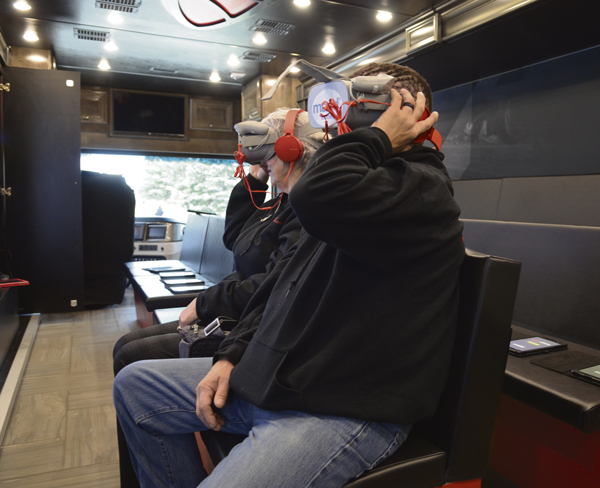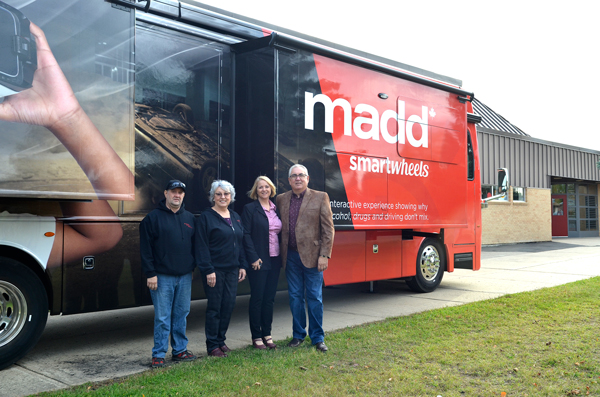
MADD Canada is moving its message beyond the lecture hall.
While presentations at school for kids to teach them the importance of not driving impaired or getting in the car with someone who is used to look like a person standing at the front of a packed gym, maybe with the help of a video or two, today’s mobile MADD classroom is a little more high tech.
MADD’s new SmartWheels mobile classroom rolled into Prince Albert this week to bring its new experience to students in grades 4-6.
The 42-foot recreational vehicle has been outfitted with a large projection screen, individual tablets and virtual reality goggles. Students take part in a fully interactive learning experience, including videos about the effects of alcohol and drugs, choose-your-own-adventure-style decision-making scenarios and virtual reality goggles that simulate how it looks and feels to drive while impaired.
The vehicle is only the second in Canada. SmartWheels is set to visit more than 100 schools and be seen by about 9,0000 students over the coming school year. It can accommodate 34 students at a time.
The vehicle, custom-made for MADD Canada, was funded in part by Saskatchewan Government Insurance (SGI) and the Saskatchewan Liquor and Gaming Authority (SLGA). The province’s total contribution was $700,000, with $500,000 of that coming from SGI. It debuted in Regina schools a few weeks ago before travelling to Prince Albert this week. Tuesday morning, it was parked outside École Vickers.

“We’re very happy to partner with MADD Canada and have this bus come around to schools in Saskatchewan,” Joe Hargrave, minister responsible for SGI, said Tuesday morning.
“We want to catch kids at a young age. That’s what will make a difference in the future, getting them thinking that impaired driving is wrong. It will make a difference in their lives …. Before they get that peer pressure in their teen years. This will make them think.”
The virtual reality goggles simulate a handful of impaired driving experiences. They allow the participants to look around and experience the blurring effects of cannabis or alcohol use from the driver’s seat of a car.
Hargrave got to experience the program when he travelled to Toronto in 2017.
“They go through what it feels like if they’re impaired behind the wheel,” Hargrave said. “(It’s) very effective. You did feel when you got up that you were still staggering. It was that effective. I … knew we needed this in Saskatchewan.”
According to MADD Canada regional manager Denise Mildner, the program is designed to teach younger students to make smart choices.
“We can help form these opinions, give them the knowledge so they can make the choice not to drive impaired (and) not to get into a car with someone who is impaired,” she said.
“With the interactive goggles, they can see what that feels like and how it impacts driving. It’s not just being told what it does, they can see for themselves what it does.”
Mildner said that after bringing the program to Regina, MADD received an unsolicited response from a teacher who said her students were “amazed.
“They came out feeling empowered that they were given the tools and knowledge they needed to make this decision themselves,” Mildner said. “They weren’t just talked to, they were given this experience.”
The other benefit is the technological approach is more relatable to the younger generation than someone standing at the front of a room for an hour, Mildner said.
“The technology talks to this age. It relates to them. It’s interactive too so it grabs their attention,” she said.
“You’re talking to them at their level, through their means. That gets their attention so they can understand.”
Mildner said that while education surrounding the effects cannabis has on drivers has been a part of the MADD program for some time, it is receiving more attention now that cannabis is legal in Canada.
“Kids don’t necessarily understand the impact driving while high can also have,” she said.
“It’s that learning curve we’re teaching There’s truth that driving high also decreases reaction time.”
According to a MADD Canada press release, studies show the use of alcohol and cannabis starts as early as age 11 and that use increases steadily between Grades 7 and 9.
“That’s what prompted MADD to launch SmartWheels in 2017 in Ontario to educate students about the harms associated with alcohol and drug use and driving before they are at risk.”

